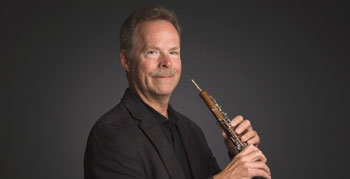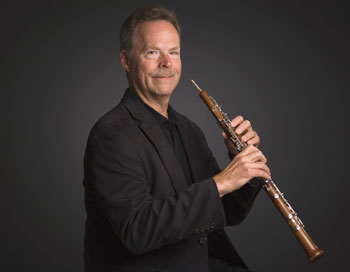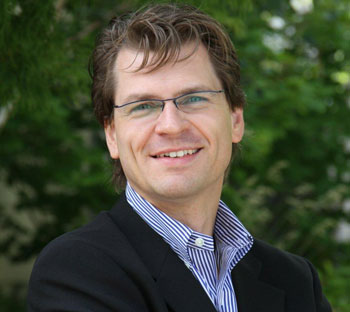Rogue Valley Symphony showcases the “gorgeous sound” of the oboe at January concerts
Oboist Neil Tatman will perform two of the great lyrical French masterpieces for oboe and orchestra at the Rogue Valley Symphony’s next concert series on January 27, 28, and 29. Music Director Martin Majkut calls Tatman’s sound a “gorgeous tone, dark and rich.” Majkut will open the concert with Britten’s Four Sea Interludes, a colorful portrait of fishermen on the rugged coast of England. He will top the program with Mendelssohn’s Symphony No.3, an “evocative” tour of the Scottish countryside.
Neil Tatman, guest oboist, will be performing Françaix’s The Flower Clock which Tatman reveals is his favorite oboe concerto. He says it is a “goldmine of joyful movements.” The modern oboe was invented and perfected by the French. Tatman says the Françaix displays “the very best of the modern French oboe’s musical personalities. The music is so joyful and so very French,” sums up Tatman. Neil Tatman will also be performing Debussy’s orchestrations of Satie’s piano pieces Gymnopédies No. 1 & 3. Tatman “chose to perform the Francaix as well as the Satie-Debussy … because both pieces are equally enjoyable for the soloist, orchestral musicians, and audience members to experience.”
Music Director Martin Majkut says of Tatman’s playing, “It is his oboe’s sound that haunts me. Neil finds the inspiration in human voice and, indeed, his playing has an almost operatic quality.” The Arizona Republic has said that Tatman possesses “emotional and technical brilliance.” Majkut says “Both the Françaix and Satie will warm up the atmosphere in the concert hall” between the other two works on the concert which depict “the gloomy British Isles.”
Britten’s Four Sea Interludes from the opera “Peter Grimes” will open the concerts. Majkut says the Four Sea Interludes “will take us to the shores of Britain – although one may as well imagine the coast of Oregon.” When Majkut talks of Britten, he says he is “convinced that his stature will only grow in the future due to the freshness, originality and lyrical qualities of his music.”
Mendelssohn’s Symphony No. 3 “Scottish” will complete the program. Mendelssohn traveled many times during his short life to the British Isles because he was so enchanted with them. Majkut says that Mendelssohn “embraced the culture (which is perhaps best documented in his music to A Midsummer Night’s Dream) but also captured the essence of British land and its people. Scotland with its evocative landscapes was the strongest inspiration.”
Friday, January 27, SOU Recital Hall, Ashland, 7:30 pm
Saturday, January 28, Craterian Ginger Rogers Theater, Medford, 7:30 pm
Sunday, January 29, GPHS Performing Arts Center, Grants Pass, 3 pm
SPECIAL Ticket DEALS: $5 for student, For Jan. 28th Medford Concert: $10 tickets available after 1/18. Call Box Office at 541-779-3000.
More information at www.rvsymphony.org
Guest Artist Bio:
Neil Tatman, Oboe
“. . . emotional and technical brilliance!”
The Arizona Republic
Oboist Neil Tatman comes to us from Tucson, where he joined the full-time faculty of the University of Arizona School of Music in 1999. He leads at least four lives–as teacher, as guest oboe soloist, as chamber musician, and as orchestral oboist.
Most recently, in 2011 he was appointed principal oboist for the Reno Philharmonic. He performed as principal oboist for the Sacramento Symphony from 1978 to 1996, continues to play principal oboe for the Arizona Opera Orchestra and associate principal for the Carmel Bach Festival. Last year he was recognized for his thirty years of continuous service as principal oboist for the Music in the Mountains Festival in Nevada City, California, where he often performs as featured soloist.
An enthusiast for new musical composition, Dr. Tatman has collaborated in many world premiere performances with the symphony orchestras in Sacramento, San Diego, Tucson, Reno, and San Francisco; with chamber groups at Arizona Musicfest, Indiana University, and the International Double Reed Society; and as a member of the Arizona Wind Quintet.
Before his move to Tucson, he taught at The University of the Pacific and California State University-Sacramento. He grew up in Kenosha, Wisconsin, and completed his graduate degrees at Indiana University, where he studied with Ray Still, John Mack. Marc Lifschey, and Joseph Robinson, and for English horn, with Thomas Stacy.
In addition to his busy professional lives, Dr. Tatman shares a fifth and lively life with his wife, violinist Mutsuko Ikenochi Tatman, and their eight-year-old identical twin daughters.


